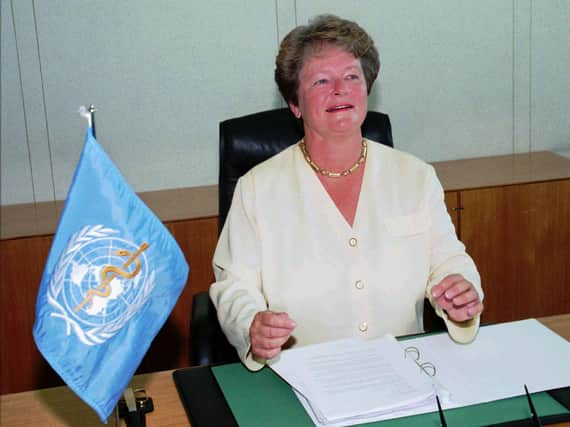Changing world’s economic system must now be highest priority – Professor Andrew Goudie


For the first time in living memory, the global economy is no longer shaped predominantly by politicians or economists, or even market forces. Instead, it has been turned on its head by the imperative of our health and the survival of millions of vulnerable people.
Globalisation, which has dominated our thinking and the formation of deep-seated interconnectedness and economic dependence, has been exposed as unable to co-exist in its present form with the fiercest of health crises.
Advertisement
Hide AdAdvertisement
Hide AdEconomic philosophies that have espoused the ability of world trade to advance living standards have been valuable, but never managed to adequately address the unacceptable implications of globalisation for other critical objectives.
Both the environmental imperatives and the importance of eliminating massive international and intra-national inequality have now been exposed as grossly misunderstood or ignored for decades, to the detriment of the stability and sustainability required of the world’s political, economic and social communities. And, now, in addition, we see that our global health objectives have simply not been accorded the primacy that they needed: they too have also violently clashed with the economic system we have created or allowed to develop.
Worldwide health risks from disease have only surfaced occasionally, as with the 2014-16 Ebola outbreak, but have not remained to the fore. Advanced economies have often seen themselves as immune. Despite high-profile warnings, they have not been at the centre of debate.
Gro Harlem Brundtland, former director-general of the World Health Organisation, spoke powerfully of the risks way back in 2001: “Illness does not respect national boundaries. The patterns of globalisation that promote increasing inequities will encourage the spread of illnesses – particularly those which are associated with extreme poverty. There are no health sanctuaries. The separation between domestic and international health problems is no longer useful, as over two million people cross international borders every single day.”
Covid-19 has demonstrated its capacity to bring the world to a virtual halt. Moreover, many scientists point to the high risk of massive disruption from viruses recurring more frequently. They see the external shocks to the environmental ecosystem from human behaviour significantly enhancing the probability of virus transmission from the animal and biological ecosystems into humans.
We need now to explicitly extend our vision of global development to embrace this new world into which our consciousness has been catapulted. We need to expand from considering economic and social development, encompassing our economic growth objectives and our distributional goals with respect to well-being, inequality and poverty, and global sustainable development, and now explicitly embrace the imperative of world health in a way that we have simply not done before. All are critical objectives and all interact intimately with the others.
Indeed, we should more sharply see health and environmental sustainability as the precondition for our world’s economic and social vision, irrespective of the precise political and societal choices as regards the latter.
The UN recently highlighted serious concerns about children’s safety and well-being as a result of the current crisis. Minimising the negative impacts of Covid-19 on children and their families will be critical to our global recovery and resilience.
Advertisement
Hide AdAdvertisement
Hide AdWe need to re-focus economic globalisation to unambiguously reflect the totality of the outcomes that we seek. This will require strong collaboration, but global governance has been seriously exposed by Covid-19, with almost no international collaboration, and just the unedifying sight of competition for crucial health resources. This perspective shouldn’t really surprise us, but Covid-19 has done exactly that.
There is a lesson from the financial crash of 2008-09, too. At the height of that crisis, the appreciation of the deep-seated weaknesses of the global financial system and the necessary fundamental adjustments that were required was well advanced. As soon as the pressure began to ease, however, the demands for fundamental change rapidly dissipated.
It will be just as important with Covid-19 that the impetus to learn and change is not similarly dissipated. There are therefore some immensely difficult choices that will have to be made in the aftermath of this crisis.
Until the science can provide more reassuring assessments of the future course of Covid-19 and about the evolution of the transmission and mutation of viruses, it seems the highest priority with which to grapple is how a sustainable economic system can be defined in this new context, that not only addresses the more familiar inequality and environmental imperatives, but also the immense global health risks.
Professor Andrew Goudie is chair of the Fraser of Allander Institute Advisory Board, University of Strathclyde, former Chief Economist at the Department for International Development and the Scottish Government; and former Senior Economist at the World Bank and OECD.
A message from the Editor:
Thank you for reading this article on our website. While I have your attention, I also have an important request to make of you.
With the coronavirus lockdown having a major impact on many of our advertisers - and consequently the revenue we receive - we are more reliant than ever on you taking out a digital subscription.
Subscribe to scotsman.com and enjoy unlimited access to Scottish news and information online and on our app. With a digital subscription, you can read more than 5 articles, see fewer ads, enjoy faster load times, and get access to exclusive newsletters and content. Visit www.scotsman.com/subscriptions now to sign up.
Advertisement
Hide AdAdvertisement
Hide AdOur journalism costs money and we rely on advertising, print and digital revenues to help to support them. By supporting us, we are able to support you in providing trusted, fact-checked content for this website.
Joy Yates
Editorial Director
Comments
Want to join the conversation? Please or to comment on this article.